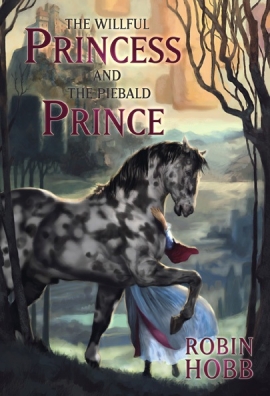The Wilful Princess
And The Piebald Prince
Robin Hobb, il. Jon Foster
2013, Subterranean Press
For something a little different. This book stands alone quite nicely, but also
functions as a prequel of sorts to the author’s popular fantasy series, much of it centering on a
dragon-plagued land called the Six Duchies, and the royal Farseer family that rules it when they're not busy killing each other. I’ve read most of the books – there are
currently 13 – and generally liked them.
They’re decent fantasy novels based on characters and convincingly portray a complicated fantasy world. This novella is much shorter and concentrated than the sprawling enormity of the rest of the series, but has many of the same elements – strong and often unlikeable women,
mysterious men, royal squabbles, high fantasy tone and a tendency toward
unexpected bloodbaths.
The backstory for this installment is that in the main
series, there’s a violent dislike for one branch of magic ability. The Wit is the ability to bond and
communicate with animals in a mystic way; Witted folk can literally speak with
animals. When this book begins, years
before the later books, being Witted is considered acceptable. When the next book (Assasin’s Apprentice) in
the series opens, the Wit is regarded as corrupt and evil. In this book, it’s explained how that
prejudice came to be. It starts with a
Queen-In-Waiting named Caution. Who is,
to put it mildly, quite unlike her name.
At 20, she’s refused to marry, refused to learn anything about ruling, and generally is vexing her indulgent parents. And then the horse fair opens.
Now among his ware
this odd trader had a spotted horse – not dappled nor speckled, mind you, but
blotted in great ugly spots, like a fruit that has taken blight, or a
poorly-dyed blanket, or a milk cow.
Black-and-white he was, with a rolling blue eye on one side of his head
and a dark staring one on the other. Big
was this beast, and a stud, unruly of temper, screaming out his challenges to
any stallion that came near and snuffing and stamping after every passing mare.
Caution sees the horse, and the Witted slave named Lostler
who is the only one who can control him.
She buys horse and man, and installs them in the royal stable, and you
can tell where this is going. But Caution's predictable disaster is not where the story ends.
The story is narrated by Felicity, the plain daughter of an
ambitious wet nurse. Maneuvered into
place as the playmate and personal maid of Caution, she has grown to love
her. She has little choice; taken from
her family at a young age and instructed harshly by her mother on how to please
a fickle princess, Felicity has virtually no one but Caution. The princess, all unknowing, is Felicity’s
family, friends and lover, all in one.
Their betrayals of each other will be impressive, especially given that
Caution really doesn’t recognize that she is betraying her – for how can a princess
betray a servant?
Honestly, not all that horsey. It is interesting, though, how Hobb uses the
horse to rachet up the sexual tension between the
heir and the groom; as the maid watches her mistress flirt with ruin.
Robin Hobb’s Six
Duchies/The Elderlings novels
Assassin’s Apprentice
Royal Assassin
Assassin’s Quest
Ship of Magic
The Mad Ship
Ship of Destiny
Fool’s Errand
The Golden Fool
Fool’s Fate
Dragon Keeper
Dragon Haven
City of Dragons
Blood of Dragons
About the Author
Margaret Astrid Lindholm Ogden (1952 - )
aka Megan Lindholm
Links
Tor Books - excerpt



